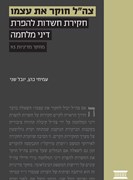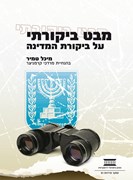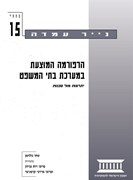

Publications Regarding investigative committees
Articles

State Commissions of Inquiry and the Differences from the Government's Politically Appointed Commission
Written By: Dr. Dana Blander, Adv. Mirit Lavi
The proposal to advance a politically appointed commission of inquiry into the events of October 7 is a significant departure from the accepted model of an independent state commission of inquiry. This explainer compares the two models and lays out the key details of each one.

Israel's government-appointed October 7 probe is no substitute for independent inquiry - opinion
Written By: Dr. Dana Blander
The Israeli government’s decision to establish its own committee to investigate the failures on October 7 is not enough.

What's A Commission of Inquiry? Explainer
Written By: Dr. Dana Blander
The Israeli government recently announced its intention to establish its own commission of inquiry into the events of October 7, 2023, rather than forming a State Commission of Inquiry—the most authoritative, independent, and legally empowered investigative mechanism under Israeli law. As Dr. Dana Blander, a research fellow at the Israel Democracy Institute, explains, Israel’s legal framework provides for several types of investigative commissions, each differing in its degree of independence, statutory authority, and public legitimacy. Notably, the government’s recent decision does not establish a State Commission of Inquiry—the appropriate and legally grounded institution for investigating the events of October 7—nor does it create a governmental commission of inquiry. Instead, it proposes a vague, ad hoc body seemingly tailored to serve specific political interests rather than the public need for a credible and impartial investigation. This explainer outlines the existing commissions - as more information comes to light about the government's planned commission, additional analysis will be provided.

October 7, 2023: The Government vs. a State Commission of Inquiry
Written By: Dr. Dana Blander
The announcement by the government this week that it does not intend to form a state commission of inquiry is a grave error—this is not only a civic and moral failure, it also harms Israel's national security and prevents the nation from healing.

Politicizing Accountability: The Proposed "Public Committee of Inquiry"
Written By: Dr. Dana Blander
The proposed "Public Committee of Inquiry," for investigating the events of October 7th and its aftermath, is an attempt to circumvent the existing framework for such investigations and is unlikely to gain public trust.

Why Does Everyone Except the Prime Minister Want a State Commission of Inquiry?
Written By: Dr. Dana Blander
Establishing a State Commission of Inquiry is the civic, moral, and public duty at the highest order. And it must be done now.

Israelis Split on Motivations for Holding the Philadelphi Corridor
Written By: Prof. Tamar Hermann, Dr. Lior Yohanani, Yaron Kaplan
Israelis are divided on the question of the main reasons for Netanyahu's demand that Israel continues to control the Philadelphi Corridor. While over half of the Jewish respondents (58.5%) think this decision is based on military and strategic considerations, 66.5% of Arab-Israeli respondents thing it is due to political reasons.

The Majority of the Israeli Public Supports Establishing a State Commission of Inquiry into the Events of October 7
Written By: Dr. Dana Blander, Dr. Eran Shamir-Borer, the Viterbi Family Center for Public Opinion and Policy Research
A special survey conducted in July 2024 evaluated public opinion on the need to establish a commission of inquiry into the tragic events of October 7th, 2024.

Across Political Orientations; Jewish and Arab Israelis Have Negative Feelings Toward the Government
Written By: Prof. Tamar Hermann, Dr. Lior Yohanani, Yaron Kaplan
Across the Left, Right and Center, rates of Jewish Israelis who say the feel "anger," "disappointment" or "frustration" are considerably higher than those expressing satisfaction, pride, or trust. A large majority of Israelis (70%) support the establishment of an inquiry into the events of Oct. 7th, but do not agree on the timing of such an inquiry.

A Two-Tiered Process of Accountability for October 7
Written By: Dr. Dana Blander
A state commission of inquiry is a vital step, but it is up to the public to ensure Israel's leaders are truly held accountable.

Official State Commission Sends Warning Letters in Submarine Acquisition Inquiry
Written By: Dr. Amir Fuchs
The State Inquiry Commission on Naval Vessels was tasked with examining the decision-making processes at both the professional and political levels between 2009-2016 in relation to the acquisition of naval vessels during those years.
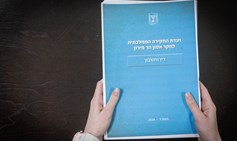
What the Mount Meron Disaster Commission of Inquiry Teaches us about a Future Commission of Inquiry on the October 7 Massacre
Written By: Dr. Dana Blander
Israel's Commission of Inquiry into the Mount Meron disaster released a report that criticizes shortcomings in the culture of accountability in Israel. The Committee distinguished between personal responsibility and ministerial responsibility and offered important recommendations, including for police operations during mass events.
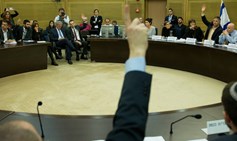
Don’t Manage a Crisis under Threat of Investigation
Written By: Dr. Shuki Friedman
Calls for the establishment of a state commission of inquiry the day after the corona, in the midst of the crisis, can lead decision-makers to make decisions based on wrong considerations
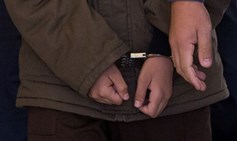
Hebron Shooting Demands IDF Investigation
Written By: Prof. Amichai Cohen
IDI's Prof. Amichai Cohen explains why Israel had to launch a swift and effective investigation into the actions of the solider that shot a neutralized terrorist in Hebron. This article originally appeared on the Times of Israel
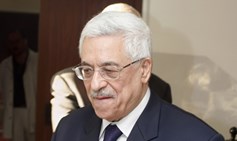
The Palestinian Authority and the International Criminal Court
Written By: Prof. Amichai Cohen, Adv. Tal Mimran
A discussion of the Palestinian Authority's declarations to the International Criminal Court (ICC), the changes that influenced the ICC prosecutor's decision to accept the PA's second declaration, and the conditions that must be fulfilled in order for the ICC to apply its jurisdiction to IDF actions or to the settlement enterprise.
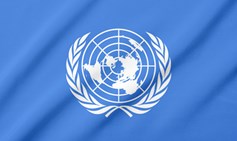
A Betrayal of International Law
Written By: Prof. Mordechai Kremnitzer
In a Jerusalem Post op-ed, Prof. Mordechai Kremnitzer argues that by breaching their responsibility to be impartial, the UN Human Rights Council and its commission for investigating alleged war crimes in Gaza are betraying international law, even if unintentionally.
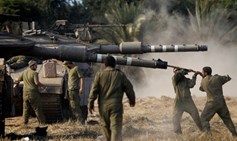
Investigating Allegations of Violations of the Laws of War by the IDF during Operation Protective Edge: The Alternatives Available to Israel
Written By: Prof. Yuval Shany, Prof. Amichai Cohen
How should suspected violations of the international laws of war be investigated? As Operation Protective Edge winds down, Prof. Yuval Shany and Prof. Amichai Cohen discuss the options of an internal investigation by the IDF, an international investigation, and an Israeli commission of inquiry.
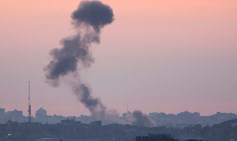
The Role of a Legal Advisor during Times of Combat
Written By: Adv. Eli Bahar
IDI Researcher Attorney Eli Bahar discusses the central role that members of Israel's system of legal counsel play in formulating the rules of what is permissible during warfare in real time, during the fighting, in order to ensure that Israel's citizens will not be ashamed of themselves after the fighting ceases.
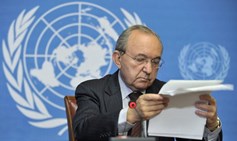
The Goldstone Retraction: Better Late than Never, and an Opportunity to Reconsider
Written By: Prof. Yuval Shany
Judge Richard Goldstone’s retraction of his commission's finding that Israeli actions in Gaza during Operation Cast Lead deliberately targeted civilians righted a historical injustice. But did the actions of the State of Israel contribute to the false impression received by the Goldstone Commission? In this op-ed, IDI Senior Fellow Prof. Yuval Shany explores the question of whether the Israeli government should also search its soul and consider participation in future international commissions of inquiry.

Opinion: Will an Investigative Committee be Set up to Evaluate Goldstone’s Findings?
As calls for an independent Israeli investigation of the events of Operation Cast Lead grow stronger, IDI's Dr. Dana Blander looks at the history of Israel's investigative committees.

Opinion: Goldstone Notwithstanding, IDF Obligated to Investigate Conduct
Written By: Prof. Yuval Shany
This op-ed by IDI Prof. Yuval Shany argues that despite the Goldstone Report’s shortcomings, it strengthens the demand to investigate claims raised against the IDF through an extra-military entity. As he sees it, the main question to address is whether the army's internal investigation of "Operation Cast Lead" meets the requirements of international law.

